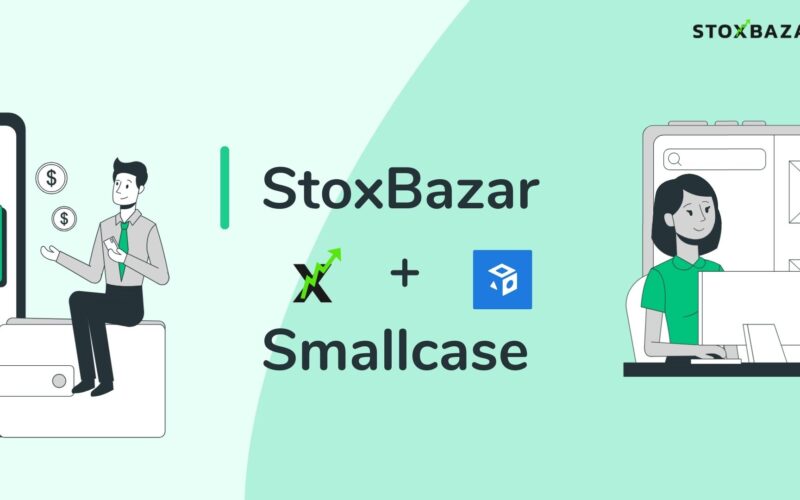Demystifying Smallcase: A Beginner's Guide to Seamless and Smart Investing

Introduction:
Welcome to the world of smart and simplified investing with Smallcase! In this comprehensive guide, we’ll break down the complexities surrounding Smallcase – an innovative investment platform that’s changing the game for investors of all levels. Join us on this journey as we unravel the fundamentals of what Smallcase is, how it works, and why it’s a game-changer for anyone looking to dip their toes into the world of investing without the headache.
Understanding Smallcase:
Smallcase isn’t just an investment platform; it’s your ticket to hassle-free investing. Imagine having a basket of investments curated around specific themes or strategies, allowing you to invest in a diversified portfolio of stocks or ETFs with just one click. Founded in 2015, Smallcase has made investing simpler and more accessible to everyone.
How Smallcase Works:
Smallcase operates on the principle of theme-based investing. Think of each Smallcase as a collection of stocks or ETFs centered around a particular idea – whether it’s the “Banking Sector Outlook” or “Digital India.” The magic happens behind the scenes, with a team of researchers and professionals doing the heavy lifting, analyzing market trends, company fundamentals, and industry outlooks to construct these ready-made portfolios.
But here’s the best part – it’s transparent. You can see exactly what’s in your Smallcase, giving you the power to make informed decisions based on your risk tolerance and investment goals. It’s like having an expert by your side, guiding you through the investment journey.
Investing in Smallcase – Simplified:
Investing in Smallcase is as easy as 1-2-3:
- Open an Account: Kickstart your investment journey by creating an account on the Smallcase platform. It’s a simple process – just fill in the necessary details and voila!
- Set Your Goals: Understand your investment goals, risk tolerance, and how long you want to invest. This helps you choose the Smallcase that aligns with your needs.
- Explore and Invest: Browse through the variety of Smallcases available. Each one comes with detailed information about its theme, the stocks or ETFs it includes, and its performance history. Once you find the perfect match, invest with a single click. The platform takes care of the rest, executing trades and allocating funds effortlessly.
Monitoring and Rebalancing – Your Investment GPS:
Keep an eye on your investments, and don’t worry – it’s not as complicated as it sounds. Here are a few things to remember:
- Performance Evaluation: Regularly check how your Smallcase is performing against relevant benchmarks. Short-term and long-term, it’s all about making sure it meets your expectations.
- Rebalancing: Your Smallcase might need a little tweaking over time due to market changes. It’s like a GPS for your investments – ensuring you stay on the right track by buying or selling assets to maintain the desired balance.
- Stay Informed: Keep yourself updated on news and market trends related to your investments. Being in the loop helps you make informed decisions about potential adjustments to your Smallcase.
Smallcase vs. Other Investments – Why Smallcase Stands Out:
Let’s compare Smallcase with the old-school mutual funds and direct stock investments:
- Diversification: Smallcase and mutual funds offer diversification, but Smallcase gives you more control over your portfolio’s composition.
- Transparency: Smallcase is like an open book; you see every stock or ETF in your portfolio. Mutual funds? Not so much.
- Cost: Smallcase generally costs less than mutual funds, saving you some extra cash.
- Flexibility: Smallcase lets you customize your portfolio in real-time, something mutual funds don’t allow.
- Expert Research: Smallcase’s research team guides you, making it perfect for beginners. Direct stock investments need more hands-on research.
Benefits of Investing in Smallcase – Why It’s Worth It:
- Focused Portfolios: Invest in themes you care about, leading to potentially higher returns.
- Transparency and Control: Know exactly what you own, and have the power to make decisions.
- Lower Costs: Save money with lower expense ratios compared to mutual funds.
- Customizable and Flexible: Tailor your portfolio to match your preferences and goals.
- Tax Efficiency: Direct ownership of securities gives you better control over your tax situation.
Risks of Investing in Smallcase – Understanding the Landscape:
Know the potential risks:
- Concentration Risk: Smallcases might focus heavily on specific themes, so diversification is key.
- Market Volatility: Brace yourself for ups and downs – it’s part of the investing game.
- Lack of Professional Management: Unlike mutual funds, Smallcases don’t have a pro manager. You’re in charge.
- Transaction Costs: There might be some fees, but they’re usually lower than mutual funds.
- Liquidity Risk: Some Smallcases may have less liquid assets, making buying or selling a bit trickier.
Conclusion – Your Journey into Smarter Investing:
Smallcase is your ticket to a more straightforward, smarter investing journey. Whether you’re a seasoned investor or just starting, Smallcase’s user-friendly platform, combined with expert research, makes investing a breeze.
Whether you choose to invest directly on the Smallcase platform or through partnerships like the one with StoxBazar, you’re tapping into a wealth of expertise and analysis. It’s an exciting journey, and Smallcase is here to guide you every step of the way. Happy investing!
StoxBazar | smallcases
